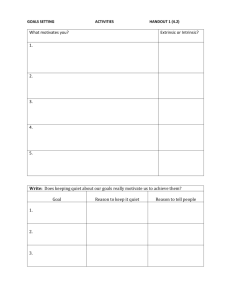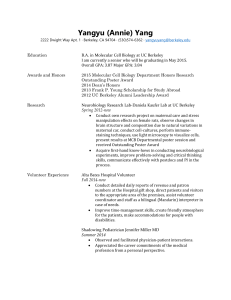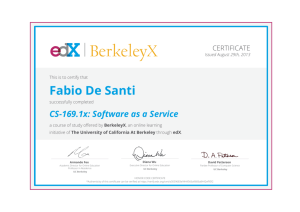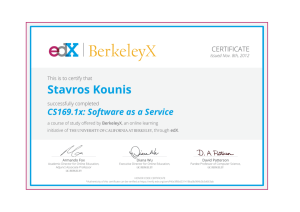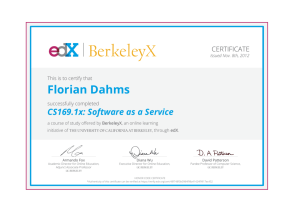Document
advertisement
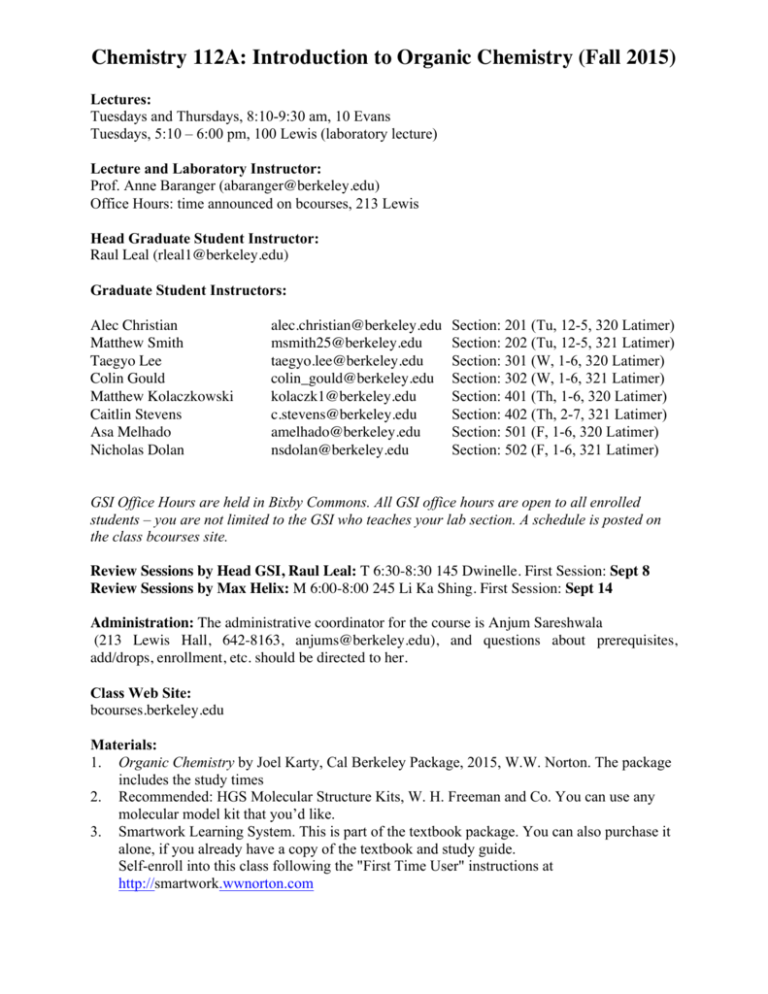
Chemistry 112A: Introduction to Organic Chemistry (Fall 2015) Lectures: Tuesdays and Thursdays, 8:10-9:30 am, 10 Evans Tuesdays, 5:10 – 6:00 pm, 100 Lewis (laboratory lecture) Lecture and Laboratory Instructor: Prof. Anne Baranger (abaranger@berkeley.edu) Office Hours: time announced on bcourses, 213 Lewis Head Graduate Student Instructor: Raul Leal (rleal1@berkeley.edu) Graduate Student Instructors: Alec Christian Matthew Smith Taegyo Lee Colin Gould Matthew Kolaczkowski Caitlin Stevens Asa Melhado Nicholas Dolan alec.christian@berkeley.edu msmith25@berkeley.edu taegyo.lee@berkeley.edu colin_gould@berkeley.edu kolaczk1@berkeley.edu c.stevens@berkeley.edu amelhado@berkeley.edu nsdolan@berkeley.edu Section: 201 (Tu, 12-5, 320 Latimer) Section: 202 (Tu, 12-5, 321 Latimer) Section: 301 (W, 1-6, 320 Latimer) Section: 302 (W, 1-6, 321 Latimer) Section: 401 (Th, 1-6, 320 Latimer) Section: 402 (Th, 2-7, 321 Latimer) Section: 501 (F, 1-6, 320 Latimer) Section: 502 (F, 1-6, 321 Latimer) GSI Office Hours are held in Bixby Commons. All GSI office hours are open to all enrolled students – you are not limited to the GSI who teaches your lab section. A schedule is posted on the class bcourses site. Review Sessions by Head GSI, Raul Leal: T 6:30-8:30 145 Dwinelle. First Session: Sept 8 Review Sessions by Max Helix: M 6:00-8:00 245 Li Ka Shing. First Session: Sept 14 Administration: The administrative coordinator for the course is Anjum Sareshwala (213 Lewis Hall, 642-8163, anjums@berkeley.edu), and questions about prerequisites, add/drops, enrollment, etc. should be directed to her. Class Web Site: bcourses.berkeley.edu Materials: 1. Organic Chemistry by Joel Karty, Cal Berkeley Package, 2015, W.W. Norton. The package includes the study times 2. Recommended: HGS Molecular Structure Kits, W. H. Freeman and Co. You can use any molecular model kit that you’d like. 3. Smartwork Learning System. This is part of the textbook package. You can also purchase it alone, if you already have a copy of the textbook and study guide. Self-enroll into this class following the "First Time User" instructions at http://smartwork.wwnorton.com You will need: 1. A valid email address 2. The enrollment key for this course: ORGCHEM8992 3. A registration code from W.W. Norton. This proof-of-purchase allows you to access your course after their free two-week trial period expires. 4. If you do not have your textbook package yet, you may sign up for a 2 week trial access while you wait for your textbook package to come into the bookstore. “For your SmartWork homework scores to transfer to the grade book you MUST enter in your CORRECT student ID number when registering for your SmartWork account. Students who do not enter in a complete and correct ID will not receive credit for homework assignments.” Link to a video to help you sign up: http://books.wwnorton.com/books/sw-student-how-to/ Grading: 360 300 40 40 100 180 20 50 30 17 Midterm Exams (120 points each) Lecture Final Exam Lecture Problem Sets (Drop one of 9) SmartWork Learning Problems (top 16 scores will contribute to this score) Laboratory Final Exam Laboratory Notebook Reports Grignard Reaction Lab Report Lab Lecture quizzes (Drop one of 11) Lecture in-class problems (Drop one of 11) Worksheets 1137 Total Assigned Problems for Lecture Component of Course: Assigned problems come in three forms. 1) Assigned problems from SmartWork System (40 points total). These will be due at 7:00am before each lecture. These problems will be at an easy to moderate level for you to gain a basic mastery of the material. Some of these problems may be based on assigned videos. Your top 16 scores will be used to calculate your total SmartWork score. 2) Weekly problem sets (5 points each). These problems will be at a higher level than the SmartWork problems. Some of the problems will be written by the instructor, and others will be assigned from the book. Additional practice problems from the book and other sources will be recommended. There will be a total of 9 lecture problem sets. 3) Graded in-class activities in lecture (3 points each). Your top 10 scores will be used to calculate this total. 2 Exams: Exam 1: Tuesday, September 29, 8:10 – 9:30 am Exam 2: Thursday October 22, 8:10 – 9:30 am Exam 3: Tuesday, November 24, 8:10-9:30 am Laboratory Exam: Tuesday, December 1, 5:10-6:00pm Final Exam: Group 11: Wednesday, December 16, 2015 3:00-6:00 pm For an excused absence at an Exam, as evidenced by a note from a medical professional or another acceptable source, the missed exam will be handled in one of two ways, at my complete discretion, as follows: (1) Your score on the missed Exam will be assigned as the average of your scores on the other two Exams, scaled appropriately to the class averages on those other exams; or (2) You will be required to take a make-up Exam. Laboratory Reports, Quizzes, and Worksheets: 1. Lab Lecture Activities/Quizzes (5 points each): Lab lectures will include a short quiz that will be related to recent or current lab lectures and/or lab experiments. The quiz may be at any time during the lecture. There will be no makeup quizzes, but only your top 10 scores will be included in the grade calculations. 2. Lab Notebook Reports (18 points each): These will be completed in lab each week, including prelab preparation, data/observations, analysis, and conclusions. There are 11 weeks of experiments, the lowest score will be dropped from grade calculations. 3. Grignard Reaction Lab Report (20 points): There will be a take-home assignment related to the Grignard lab experiment, in addition to the normal lab notebook report. Details will be provided at a later date. 4. Worksheets completed at home or in laboratory. These will focus primarily on laboratory techniques, especially NMR. Course Grade The table below shows the correlation between your final grade and the total number of points you earn. The point ranges may be lowered slightly when final grades are assigned. Bonus points will be offered from time to time for completing surveys. Grade A+, A, AB+, B, BC+, C, CD+, D, D-, F Range 978-1137 819−977 625−818 0−624 Percent 86−100% 72−85% 55−71% 0−54% General Course Policies: Cheating and Plagiarism: Any cheating in examinations and any other unethical conduct will result in an automatic grade of F, a report to the committee on student conduct, and procedures designed to alert past and future professors about any such incidence. Don’t do it! If you have a problem of any sort that impinges on your performance, see Professor Baranger, rather than resorting to ill-informed and poorly conceived measures. 3 Lecture Component of 112A This course provides a comprehensive introduction to the fundamentals of organic chemistry – the chemistry of carbon and its compounds. We will first review electronic structure and bonding. We will then focus on four general topics: 1. 2. 3. 4. Conformation and structure Reaction mechanisms Reactions involving alkenes and alkynes Substitution and elimination reactions All of these topics are interrelated. An important objective of the course is to provide you with an understanding of organic chemistry to apply to problems you encounter in the future involving organic chemistry. By the end of the class you should be able to: 1. Predict the 3D dynamic structures of organic molecules. 2. Represent mechanisms of organic reactions with arrows, reaction energy diagrams, and orbitals 3. Identify nucleophiles, electrophiles, and leaving groups in reactions. 4. Predict products, including regio and stereoselectivity, based on knowledge of the mechanisms of reactions. 5. Propose multistep syntheses of organic molecules. 6. Use an understanding of the kinetics and thermodynamics of a reaction, predict how the rates and product compositions are affected by changing the substrate, adding a catalyst, changing the temperature or solvent, etc. Course Outline: The following topics will be discussed in the order shown below (subject to change). The number of lectures per topic will vary. Topics not found in the text will be inserted when appropriate. Topic 1 Topic 2 Topic 3 Topic 4 Topic 5 Topic 6 Topic 7 Orbitals, bonding, and structure Conformational analysis Stereochemistry Acid/Base Substitution and elimination reactions Electrophilic Addition Reactions of Alkenes and Alkynes Extended orbital systems 4 Laboratory Component of 112A Laboratory Lecture: These discussions (Tuesdays 5-6 pm) will focus on the theoretical and practical aspects of the lab experiments. Topics will include the principles underlying important purification methods (including crystallization, extraction, sublimation, distillation, and chromatography) and analysis methods (including measurement of physical properties, thin layer chromatography, HPLC, and spectroscopic characterization). Laboratory: The laboratory sections will provide an introduction to the techniques of experimental organic chemistry, including methods of compound purification, characterization, and structural determination. Many of the experiments require that you work in groups of two to four students. It is important to compare your data to those of others and determine whether your findings are consistent with what is expected. Group work requires cooperation and sometimes patience. Please note that no person in a group is to rush the other group member in order to finish early. If it is determined that this is occurring, the graduate student instructor has the prerogative to excuse the person involved, resulting in a score of 0/20 points for that lab report. Laboratory Attendance Attendance in lab each week is mandatory. Requests for exceptions to this policy (as outlined below) should be emailed to Prof. Baranger (abaranger@berkeley.edu) with cc’s to your GSI. • Students who will be away from campus on a laboratory date for a sanctioned University event (e.g., university band, play on a university athletic team - not club) must email us at least one week in advance of the planned absence. Upon email notification, a reasonable attempt will be made to arrange participation in an alternate lab section prior to the travel dates. • Students who have a personal or family emergency and have to travel home or be in the hospital (a signed and stamped doctors note is necessary) should contact us as soon as possible. All reasonable effort to accommodate the student in another laboratory section will be made. Unfortunately, a special individual laboratory experience cannot be arranged and so in the event that they are unable to make up the laboratory in another section, they will forfeit that laboratory grade (there is one dropped lab score included in the grading scheme to accommodate this circumstance). 5 Laboratory Schedule: Week Lab Lecture Date (Tues) 1 First Lab Date (Wed) Lab Experiment 8/26 No Lab lecture on Tuesday of this week. Lab Check-in, Safety, and Worksheet Expt. A: Thin Layer Chromatography 2 9/1 9/2 3 9/8 9/9 4 9/15 9/16 5 9/22 9/23 6 9/29 9/30 7 10/6 10/7 8 10/13 10/14 9 10/20 10/21 10 10/27 10/28 11 11/3 11/4 12 11/10 13 11/17 11/18 14 11/24 - 15 12/1 Exam 12/1 (Tu) Expt. B: Separation of Organic Compounds Using Liquid-Liquid Extraction Expt. C: Column Chromatography (Handout) Expt. A-C Finish: Analysis of purity and relative yield from weeks 4 and 5 using TLC and HPLC Expt. D: Recrystallization and Melting Points: Separation of Salicylic acid and Adipic Acid Expt. E: Isolation of Trimyristin from Nutmeg Expt. E: Finish Isolation of Trimyristin Expt. F: Asymmetric catalytic transfer hydrogenation (Handout) Expt. D, E and F Finish: Analysis of purity separation of products from Expts D, E and G by TLC, NMR (trimyristin), and HPLC (asymmetric transfer hydrogenation) Expt. G: Nucleophilic Substitution Reactions Expt. H: The Grignard Reaction No Lab sections – Veteran’s day Expt. I: Some Chemistry of α-Pinene Oxide Lecture and Tuesday lab only. No lab Wed-Fri (Thanksgiving). Procedure Pedersen textbook: p. 241 and handout posted on bCourses (called Experiment 7) Handout – posted on bcourses Handout – posted on bcourses Handout – posted on bcourses Pedersen textbook: p. 230 (called Experiment 5) Pedersen textbook; p. 261 (called Experiment 11) Handout – posted on bcourses Handout – posted on bcourses Pedersen textbook; p. 257 (called Experiment 10) Pedersen textbook; p. 278 (called Experiment 14) Pedersen textbook: p. 291 (called Experiment 16) Lab Exam (during lab lecture time), lab checkout (Tues-Fri). 6

